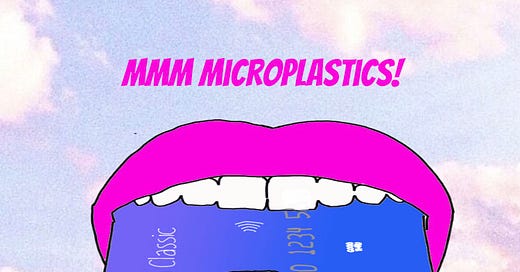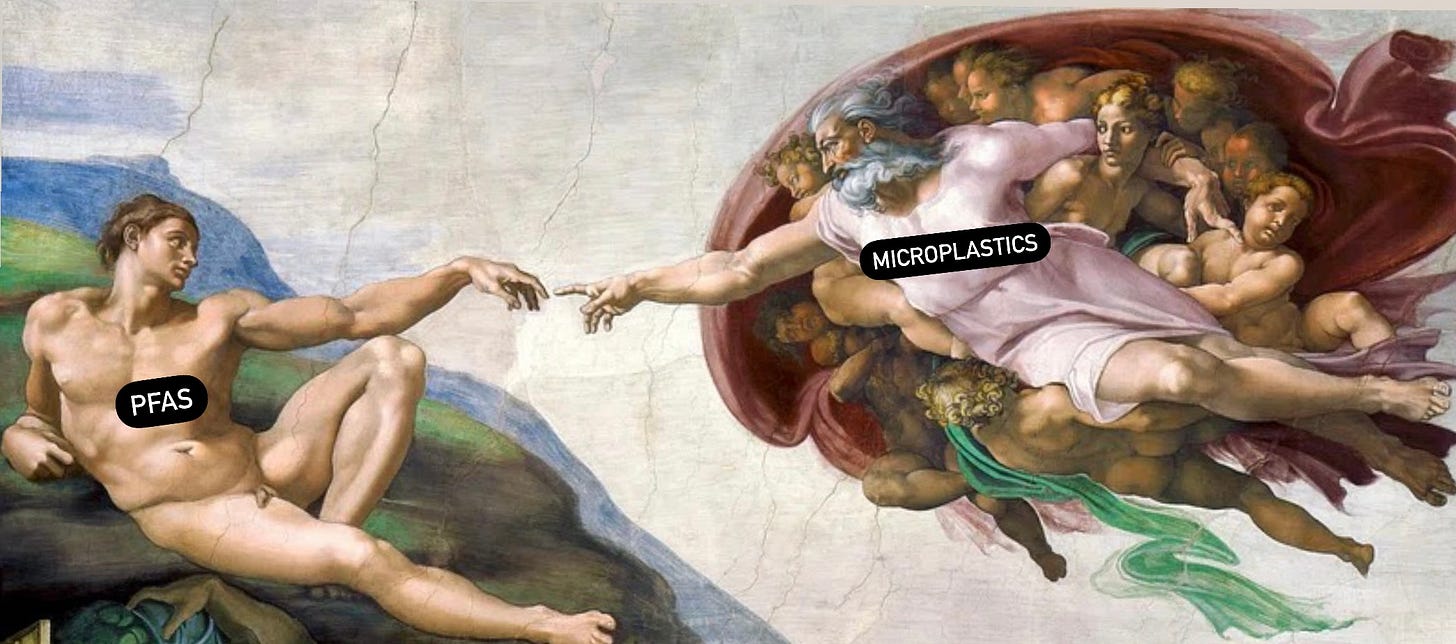Bye satanic panic, it's time for plastic panic
the only matter more omnipresent than microplastics is God
Greetings from Greece! Today, we have a special guest, chat microplastics, and share the top ten strategies to avoid them. Enabled comments for all so I can read your thoughts in time for my return to Marseille.
I regret to inform you that we ingest a credit card’s worth of plastic per week.
While in Greece, Emily Carter (an ex-colleague/forever friend) and I discussed microplastics. Emily is a New York City-based adman, but she’s not your typical adman. The Goldilocks of business savvy + creative vision, she can launch a product in her sleep and is passionate about global health, microplastics, and climate. I believe everything she says, you can read her work here.
Below, I’ve edited our conversation plus some of my research into a narrative with key takeaways I think you should know (while listening to “Plastic” by Slayyyter).
WHAT ARE MICROPLASTICS?
The word “plastic” comes from the Greek word plastikos, meaning “capable of being shaped/molded.” In turn, microplastics are small pieces of plastic that either break off from bigger plastic things, shed from synthetic fibers, or are intentionally manufactured to be small (like microbeads). We all remember the ads of fresh-faced women washing their visages with microbeads and splashing themselves with buckets of water fit for a waterboarding session.
These fragments are often invisible to the naked eye, making them particularly difficult to track and manage. Despite their size, their impact is big. They’re everywhere. This is not hyperbole, but a simple, disturbing fact. Scientists have found microplastics wherever they’ve thought to look. They’ve found traces of microplastics in our environment. Nowhere is safe, neither the Arctic ice nor deep sea. Our soil and air are filled with microplastics. They’re also inside of us. Likely in every inch of our bodies, but confirmed in the placenta, breast milk, blood, feces, your testicles (more on this below).
We consume microplastics passively: by breathing in plastic particles in the air, ingesting them through the food we eat and drinks we drink, and through skin contact (unfortunately, not the Orchard Street bar).
WHY SHOULD YOU CARE?
When I asked Emily why this was a health issue people needed to know about, she explained, “The problem when we ingest the plastic is not necessarily the plastic itself. It’s that hitchhikers like toxic chemicals, bacteria, and metals bind to the plastic. Once these accumulate in our bodies, they start fucking shit up.” By this, she means that internal processes and temperature can trigger the release of these toxins from plastic particles inside us. This is concerning because some of the chemicals that are besties with plastic are already linked to cancers and other health problems.
We don’t yet understand the long-term effects of microplastics. The same was true of lead and DDT until we studied it. Yet, when English scientists added microplastics to human cells, they reported tissue damage, allergic reactions, and cell death.
Current evidence shows that microplastics disrupt our endocrine system (thus, also hormones), impact our immune response, are tied to inflammation, and are linked to cardiovascular and respiratory issues. In March of this year, researchers in Italy published that microplastics increased the chances of a heart attack, stroke, or death for patients with plaque in their carotid artery (neck) vs patients without traces of microplastics.
Are you still thinking about testicles? A study in Toxicological Sciences from May of this year tested male human + dog testicles (dog sperm production is a better analog for human sperm than rats) for common synthetic substances. While both had microplastics, human testicles had almost 3x the amount than that of dogs. Because animal studies show microplastics impact sperm count/quality, researchers hypothesize the same is true for humans.
WHAT CAN YOU DO TO AVOID MICROPLASTICS?
Most of the microplastics we’re exposed to are out of our control. The assumption is you love breathing, so reducing your exposure is the only option. Here are Emily’s top ten evidence-based strategies for avoiding microplastics:
Reject modernity, embrace tradition: Go to an island without cars. Perhaps the Greek Island of Hydra or Brazil’s Ilha Grande if South America is more your style. Most of the microplastics we ingest come from the air we breathe…and tires.
Natural fibers only: Your lululemons are polluting our water systems. This is a double-whammy. It reduces microplastic skin contact and microplastic release. The heat from washing our clothes in hot water and drying them releases thousands of microplastics into the environment. Line drying is better for your clothes, too. If you buy synthetic fibers because they’re cheaper, consider second-hand and resale options. It’s our go-to move.
The less processed, the less plastic: Highly processed foods have more contact with plastic. Limit your consumption as best you can. Frozen meals don’t even taste that great anyway.
Elevate your kitchen + food storage game: when you expose your food to plastic cutting boards and Tupperware, plastic seeps into your food. Prioritize wood, glass, and steel. We don’t mean throw out your entire kitchen, but start small. Do you have an old plastic cutting board that’s seen better days? Consider an olive wood or bamboo cutting board. Lost your Tupperware container’s top? Replace it with a glass storage container. Use what you have until it’s time to replace it, then swap it with better alternatives. Or repurpose them for non-food use.
Tap into tap water: because plastic bottled water has more microfibers than tap water, you’re better off prioritizing tap water where possible
Put a filter on it: Tap water may have traces of unwanted PFAS and microplastics, so make sure you’re filtering it. Reverse osmosis, or any NSF-certified water filter works, we have options.
Too hot to go: Avoid single-use plastic, especially for food. And don’t reuse single-use plastic for your food. As plastic heats up, it breaks down and releases microplastics into your food. If you’re a microwaver, avoid microwaving in plastic containers.
Oyster happy hour is canceled: Sorry to Keith McNally, but bivalves have a high concentration of microplastics. This is the hardest one for me to follow. Consider eating from higher in the food chain and reflect on where your food comes from. For example, root vegetables have a high microplastic count because they chill in the soil.
Clean your house: Vacuuming (with a HEPA filter) and wiping down surfaces reduces microplastic exposure because dust has microplastics. Use an old rag, don’t buy a microfiber cloth (I’ll ideate better options with my cleaner on this and come back to you).
Staying informed is hot, but supporting legislation that reduces plastic use is even hotter.
WHAT ARE THE POLICY ASKS?
We can do everything in our power to reduce our exposure. But this is a systemic issue that needs policy solutions to protect public health.
Funding microplastics research + monitoring: I always say this, and it doesn’t seem like a clear policy solution, but promoting research in target areas yields data we can use to build evidence-based solutions
Promoting R&D for biodegradable + alternative materials, including financial incentives for companies that seeking solutions
Improving waste management systems: Recycling is a myth. Can we improve it? Can we make manufacturers responsible for the entire lifecycle of their plastic products? Treating water systems
Regulating plastic production, emissions, and use: This can include the regulation of certain additives to textiles and artificial sports goods to complete bans on things like microbeads in cosmetics
Collaborating cross-border, and globally: Collaborate with neighboring countries to tackle plastic pollution in shared water bodies and ecosystems. Joint international agreements for reducing plastic pollution
Later this week, I’ll share Greece highlights.
xxsem





what are some reliable orgs working on legislation or research so i can stay informed, sign petitions, maybeeee donate?